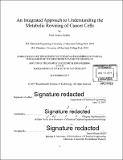| dc.description.abstract | Cancer remains a leading worldwide health problem, and in the U.S., 1 in 3 women and 1 in 2 men are expected to develop it during their lifetimes. While the last several decades have provided tremendous understanding of the genetic mutations and signaling pathways that give rise to oncogenic transformation. However, the field of oncology has only relatively recently begun to appreciate the extent of metabolic rewiring required to sustain the uncontrolled growth of tumors. Cancer metabolism is now an active area of research, and efforts are underway to expand the range of oncology diagnostics and therapeutics through targeting metabolism. Despite this progress, there remains much unknown about the extent of metabolic remodeling in cancer cells, including the influence of proliferation, oncogene activation, tumor suppressor loss, tissue of origin, metastatic potential, environmental cues, and many other factors. Further, metabolism comprises a large and complex network of interconnected reactions and transport processes that interface with many other components of cell physiology. In the field of metabolic engineering, there is precedence for using systems-wide approaches to studying metabolism, and these can be applied to cancer cells to unravel the contribution of such factors to the metabolic phenotype. In this thesis, we describe an integrated approach, spanning multiple computational and empirical techniques derived from metabolic engineering, to understand contributors to cancer metabolism. We specifically focused on the influence of proliferation (i.e. cell growth and division) for our analysis. We first review how some of the techniques of metabolic engineering, most notably stable isotope tracers, can be used to study metabolism in cancer cells. Next, using a published account of hybridoma composition, we analyzed the metabolic requirements of proliferation through reducing mammalian cell biomass needs to a small number of precursors and cofactors. We then incorporated this information into a stoichiometric network to understand how metabolic flux became redistributed following either shifts in metabolic objective or the introduction of constraints to simulate respiratory impairment. These investigations revealed the high biosynthetic burdens of amino acids, ATP, and NADPH, but also demonstrated the flexibility through which metabolism can adapt to fulfill these needs. Finally, we established a cell line system to study the differential metabolic effects of proliferation and expression of an oncogenic mutant of KRAS that drives growth factor-independent division. We found that, in the growth-titratable control cell line, proliferation was accompanied by a dramatic switch of branched-chain amino acid catabolism for TCA cycle flux to proteinogenesis. Additionally, we saw that cells undergoing oncogenic KRAS-driven growth possessed lower consumption rates of the major carbon metabolic substrates, glucose and glutamine, than the growth factor-sensitive control line growing at comparable rates. Our multifaceted approach toward understanding the influence of proliferation on metabolism in cancer cells clarifies the biosynthetic requirements for growth and range of metabolic strategies through which they can be satisfied. As well, our comparison of growth vs. oncogenic KRAS-driven metabolism represents, to our knowledge, the first rigorous attempt to deconvolute the proliferation- and oncogene-specific effects on metabolism in a cell line model. | en_US |
